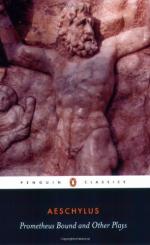|
This section contains 13,020 words (approx. 44 pages at 300 words per page) |

|
SOURCE: Beck, Robert Holmes. “Moral Lessons in Aeschylean Drama.” In Aeschylus: Playwright Educator, pp. 14-41. The Hague: Martinus Nijhoff, 1975.
In the following essay, Beck explores the Greek moral code and how Aeschylus treated it in his plays.
“Zeus, who guided men to think // who had laid it down that wisdom // comes alone through suffering.”
(Aga. 176-78)1
The Greek moral consensus reached beyond Athens and included other Greek cities in a community of religious and moral values. The contributions that Aeschylus made to this consensus were those of the tragedian, who persuades his audience to learn wisdom through observing the suffering of others. The audience is not deceived by a pretense that it is relatively easy not to transgress by restraining a desire either for wealth or for power or even for status. The playwright is no Plato who has Socrates resort to duping the public by telling them...
|
This section contains 13,020 words (approx. 44 pages at 300 words per page) |

|


